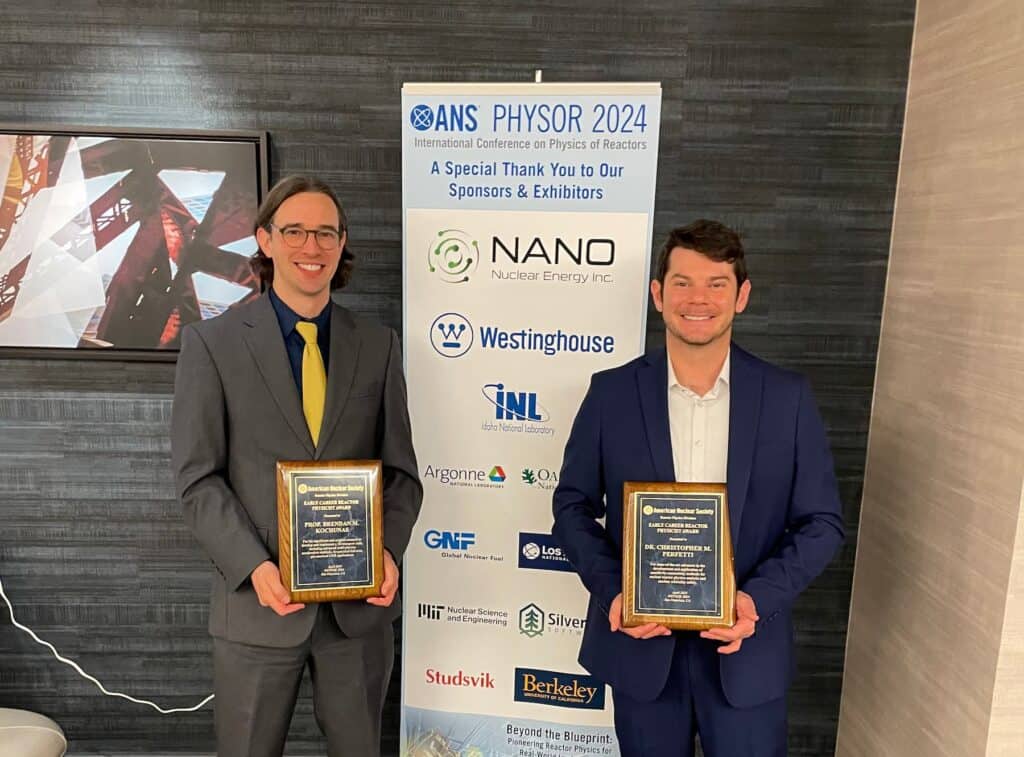
Brendan Kochunas honored with ANS Early Career Reactor Physicist Award
The American Nuclear Society award recognizes those who have made noteworthy contributions to the realm of reactor physics during the early stages of their careers.

The American Nuclear Society award recognizes those who have made noteworthy contributions to the realm of reactor physics during the early stages of their careers.
Brendan Kochunas, assistant professor of nuclear engineering and radiological sciences, has been awarded the prestigious American Nuclear Society Early Career Reactor Physicist Award. This recognition is bestowed by the Reactor Physics Division in acknowledgment of early career professionals who have made significant contributions to the field of reactor physics.
The Early Career Reactor Physicist Award recognizes individuals aged 39 and below, who have been active members of the Reactor Physics Division for at least three years. Candidates must have demonstrated their expertise by publishing a minimum of four full papers of exceptional technical quality, serving as the lead author in the area of reactor physics. These publications can include peer-reviewed journal articles or conference papers in esteemed platforms such as Nuclear Science and Engineering, Nuclear Technology, or events like PHYSOR.

Kochunas was honored for his significant and original research to developing and implementing a 3D-transport code including advanced multi-physics acceleration methods, for practical full-core, pin-resolved light-water reactor applications.
“I am thrilled to have this recognition,” said Kochunas. “As a researcher, my goal is to try and go deeper into the problems I see and work towards new knowledge and understanding. I always have a bit of self-doubt as to whether I am working on problems that are important. This award now gives me a bit of confidence that the work we do and our results are useful to others.”
Kochunas specializes in next-generation numerical methods and parallel algorithms for high-fidelity computational reactor physics. His expertise spans areas such as neutron transport, nuclide transmutation, multi-physics, parallel programming, and HPC architectures. Since joining the NERS faculty in 2019, he has led the Nuclear Reactor Analysis and Methods (NuRAM) group and the Nuclear Plant Simulation Laboratory (NPSL). Within the NPSL, he oversees the Virtual Ford Nuclear Reactor (VFNR), an XR Initiative funded by the U-M Center for Academic Innovation.
During his PhD studies, Kochunas spearheaded the development of the MPACT code, a key deterministic neutronics tool within the CASL (Consortium for Advanced Simulation of Light Water Reactors) project and subsequently within VERA (Virtual Environment for Reactor Applications). MPACT, originating from his doctoral research, has become a central research tool for over 16 other PhD students in the NERS department.
Additionally, Kochunas contributes to Project SAFARI, a NERS-based initiative focused on developing AI-enhanced digital twins of nuclear reactors. This project is funded by the Advanced Research Projects Agency–Energy.
In 2022, Kochunas was given a U.S. Department of Energy (DOE) Office of Nuclear Energy’s Distinguished Early Career Award, which he used to support research on advancing the digital twins concept for nuclear engineering applications. Through data simulations, Kochunas aims to create foundational models for nuclear energy systems and develop corresponding teaching methods.
“Brendan continues the longstanding tradition of excellence in the field of reactor physics at the University of Michigan,” said NERS Chair Todd Allen. “We look forward to his decades of leadership.”